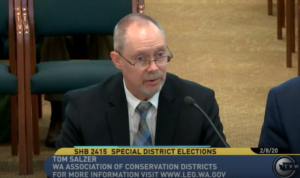WACD Testified in Opposition to HB 2415 on Special District Elections, February 14, 2020
On Saturday, February 8, 2020, WACD Executive Director Tom Salzer testified in opposition to House Bill 2415 (conforming elections for certain special districts with Title 29A RCW). The Washington Association of Conservation Districts opposed HB 2415 because we are deeply concerned about the unintended consequences of this proposed legislation.
A few days before the House Appropriations Committee hearing, WACD learned that the Department of Commerce’s fiscal note on the impacts to local governments merely said the impact was “indeterminate.” The fiscal note from the Washington State Conservation Commission showed that the Commission would save a significant amount of money if conservation district elections were handled by county auditors instead of the Conservation Commission.
In essence, legislators were hearing that the state would save money if they acted to put conservation district elections on the general ballot. WACD believed that legislators were unaware of the high cost these elections would impose on local conservation districts.
With only a few days before the hearing, WACD asked conservation districts to work with their county auditor to estimate the cost of having districts on the general election ballot. We heard from 20 of Washington’s 45 districts and carried those estimates into the hearing, informed the Committee members that the minimum cost for 20 conservation districts to have one board position on one general election ballot totaled $2.9 million dollars.
WACD informed the Committee that election costs cannot be paid for from the grants and county funding that conservation districts rely upon to be successful. Conservation districts will be unable to pay for these elections without substantially sacrificing service to landowners, communities, and natural resources.
Conservation districts have waiting lists that extend from one to two years, or more. At a time when limited resources are in such high demand for project assistance, that work would be reduced and shifted to covering election costs. The net result of this new policy of having conservation district supervisors on the general ballot will be a reduction in service to landowners and less progress on our most critical natural resource issues.
Conservation districts can’t pay these election costs without reducing service and the state’s natural resources will suffer as a result. Our future biennial funding requests will be to cover these new costs AND for additional technical assistance funding. We do support the State Conservation Commission’s request for more time to work with conservation districts and stakeholders to identify opportunities to improve community engagement and election processes.

